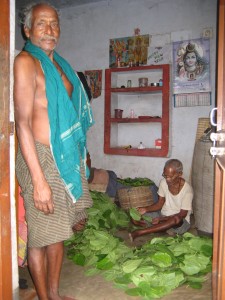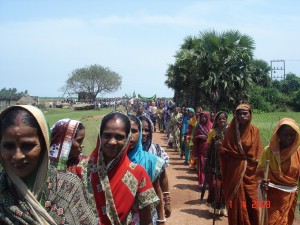by Girish Agrawal and Anu Mandavilli
Control over natural resources has been a major source of conflict in human history. The increasing demand for exploitation of natural resources, particularly mineral resources, has become the leading driver of conflicts, often violent, in much of the global south. It is estimated that a quarter of all armed conflicts today involve the extraction of natural resources.
Increasingly, such conflicts most affect indigenous populations, as they live in areas which were relatively inaccessible to the outside world until recently, or were not considered worth exploiting until the accelerating demand for resources or the evolution of new extractive technologies made them “valuable.” Examples abound: oil extraction in the Niger Delta, coltan mining in the DRC, copper mining in Papua New Guinea, and the rush to mine various metals and minerals in the state of Orissa, India.

Under a neo-liberal economic order, private entities can begin to exercise influence and authority in domains that, in a democratic framework, are governed by legitimate custodians of public interest. A typical example of the manner in which this occurs can be seen in the conflict in the Jagatsinghpur area of Orissa. We argue that such exercise of power by corporate entities, insofar as it is hidden from public scrutiny, functions to alienate decision-making from marginalized groups. In other words, the devolution of responsibility by the state, in parallel with the lack of accountability by powerful private actors, works to induce conflict between people and the unresponsive state.
The POSCO Conflict: Misuse of State Power and Peoples’ Resistance
POSCO, the South Korean steel giant, struck a deal in 2005 with the state government of Orissa to build an integrated steel plant with a capacity of 12 million tons per annum (MTPA) on the coast in Jagatsinghpur district. This 12 billion USD project, touted as the largest-ever foreign direct investment in India, comprises a steel plant, captive mines, and dedicated port facilities.
The land that POSCO wants for the steel plant and port is a mix of coastal mangroves and forests where about 22,000 villagers live and work. Another 25,000 people from the neighboring villages also depend on the agricultural economy and coastal access to pursue their livelihoods of fishing, farming, and collecting minor forest produce.
As per the Memorandum of Understanding (MoU), the land acquisition for the project would be managed by the state, an arrangement that hands many strategic advantages to POSCO.

First, if POSCO, a private entity, were to directly acquire land, it would have to purchase it at market rates. The state, however, is free to invoke the idea of “greater public good” and exercise its power of eminent domain to acquire land by force, and at throwaway prices. The resulting displacement and dispossession of the land’s current owners and occupants is brushed aside by deploying rhetorical justifications about how the land acquisition is in the larger interests of “development,” “national progress,” etc. The state government has so far acquired about 438 acres of prime land for POSCO by invoking emergency provisions of the Federal Land Acquisition Act, a colonial-era law which cuts off the land owners’ legal right to demand a hearing, or indeed to even ask for fair compensation. This move has effectively netted POSCO an estimated profit of more than 10 million USD – even before the project breaks ground (this style of land acquisition is not unique to the POSCO project: an April 2012 report from India’s Comptroller and Auditor General pointed to serious irregularities by the Orissa state government in the allocation of land to private promoters, the misuse of emergency provisions for land acquisition, and drastic under-valuation of privately held land).
Second, when the state is in charge of land acquisition, POSCO stands to benefit from the state’s ability to mobilize the police, paramilitary troops, and other legitimized sources of physical coercion. The land that POSCO wants for the steel plant is home to more than 22,000 people, and to date, there have been multiple documented attacks by police on local villagers as they were demonstrating against the POSCO project (in 2007, one such attack resulted in the death of local villager Tapan Mandal after he was shot by the police), and paramilitary troops have been used multiple times to thwart democratic participation, such as during the public hearings about the project in April 2007.
Further, given the present “difficulty” of suppressing the global spread of news about resistance by people on the ground in response to forcible evictions in the name of development, it is possible that POSCO wished to, at least nominally, stay within legal bounds. The special relationship it has cultivated with the state of Orissa allows POSCO to maintain this patina of legitimacy while the state deploys its coercive powers and manipulates local laws on behalf of POSCO, and the state bureaucracy and government agencies stump tirelessly for the project. For example, journalist Amarnath Parida reports that in April 2012 residents of Polang village complained to a visiting investigative team from the National Human Rights Commission of India that officials from the state agency IDCO, which brokers land acquisition for POSCO and other industrial behemoths, have been interfering in efforts to organize against POSCO on the ground.
Despite such extensive support from the state, the POSCO project has been unable to get off the ground. This is because the local community’s historical memory – of the stories of the oustees of the Hirakud Dam (1962) who have yet to be rehabilitated, of state-sponsored violence in Nandigram, Singur, and Kalinganagar, and the records of those still waiting to realize promises of employment in the oil refineries and ports in the region – has made them less willing to trust the government’s promises. Various studies by governmental and non-governmental panels have demonstrated that such fears are in fact well-founded. Equally importantly, the sheer size of the POSCO project and its requirements in terms of natural resources have made it clear that local communities are going to be directly competing with POSCO for land, water, and other resources.

The irregularities of the land acquisition process in this case are symptomatic of the profound inequalities of Indian society while also being instructive as to the concrete ways in which asymmetries of power manifest themselves in the “development” process. The ongoing conflict in Jagatsinghpur is a result of the desire of socio-economic elites in poor countries to rapidly and cheaply extract natural resources, hiding behind the mantra of development and using the neoliberal “public-private partnership” model. It bears repetition that this kind of partnership between POSCO and the State of Orissa is possible only because the state, far from representing and protecting people’s interests, has placed itself squarely on the side of a mega corporation and has taken a clear adversarial stance against its own people. Development of this sort operates by stripping communities of control over their lives, their livelihoods, and their environment. It displaces and pauperizes local communities, and far from being better off, they face greater instability and insecurity than ever before.
Girish Agrawal and Anu Mandavilli are members of the Mining Zone Peoples’ Solidarity Group (MZPSG), an international research and advocacy group focused on India, with core interests in new economic policy. MZPSG’s publication, “Iron and Steal: The POSCO-India Story” investigates the social, economic and environmental effects of the POSCO project and presents data that challenges POSCO’s claims about employment generation and other putative benefits of its project. The full report is available at www.miningzone.org.
 Advocating for nonviolent change, the Center for Conflict Studies emphasizes research and practice to better understand conflicts and manage them effectively in order to bring changes to current inequalities and social injustices. Our magazine, Reflections, will be published in annually.
Advocating for nonviolent change, the Center for Conflict Studies emphasizes research and practice to better understand conflicts and manage them effectively in order to bring changes to current inequalities and social injustices. Our magazine, Reflections, will be published in annually.

